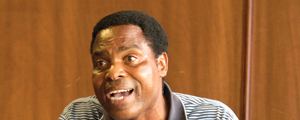
FORMER war veterans’ leader Jabulani Sibanda has made sensational claims that he was at one time in the mid-1980s charged with espionage and placed on the dreaded death row at Chikurubi Maximum Security Prison for voicing against the Gukurahundi massacres.
BY NQOBILE BHEBHE
Sibanda, who was kicked out of Zanu PF late last year for alleged misconduct and plotting President Robert Mugabe’s ouster, said the espionage accusations were raised after he took pictures of the atrocities when he was still part of the late Vice-President Joshua Nkomo’s security team.
He made the sensational claims last week during a public meeting organised by Bulawayo Agenda to reflect on Zimbabwe’s 35th Independence anniversary.
“People tend to talk about Gukurahundi now when all is quiet and some never experienced it. I was in Joshua Nkomo’s office as his bodyguard.
“I was arrested and taken to Chikurubi and placed on death row, when people like (Gilbert Sitshela) Ngwenya were hanged, and spent time digging up graves and taking pictures of dead people,” said Sibanda. However, Sibanda would not clarify the time he spent on death row and how he was set free.
He said he fought against the massacres using lenses and got arrested for espionage. In 1983, the then Prime Minister Robert Mugabe set up a commission of inquiry into the Matabeleland disturbances, also known as the Chihambakwe Commission of Inquiry, which ran for approximately 12 months.
According to the Catholic Commission for Justice and Peace, the genocide left about 20 000 people dead. The Chihambakwe Commission of Inquiry was to investigate the killing of 1 500 people in the Matabeleland region and to gather testimony from villagers about what occurred, and by 1987, when the Unity Accord was signed, an estimated 18 500 more people had died.
- Chamisa under fire over US$120K donation
- Mavhunga puts DeMbare into Chibuku quarterfinals
- Pension funds bet on Cabora Bassa oilfields
- Councils defy govt fire tender directive
Keep Reading
The commission was reportedly set up to investigate the genocide and to assuage widespread international and domestic criticism of the killings.
However, 32 years later, the government is yet to release the report, with authorities saying they feared its publication could spark violence over past wrongs.











